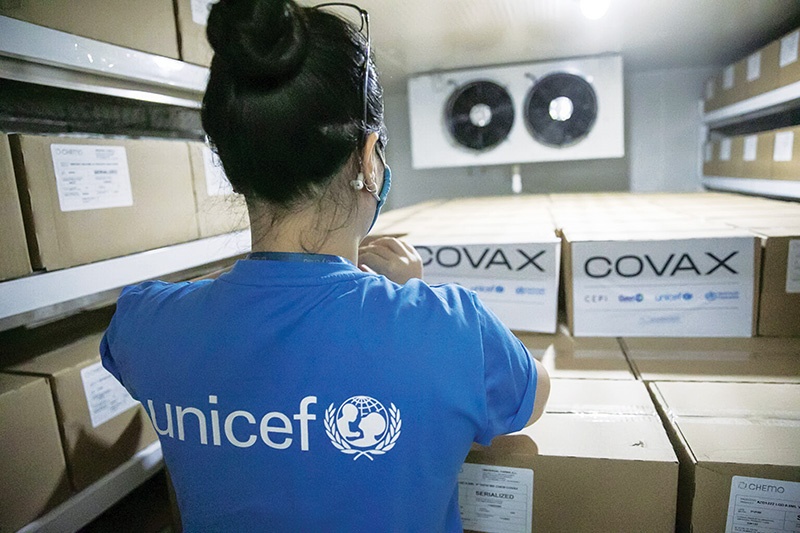US increases its presence with CDC and vaccines
 |
| With a planned $4 billion vaccine contribution, the US is the largest financial donor to COVAX. Photo: Le Toan |
Recognising the devastating impact of COVID-19 on both countries, the US sent an additional one million doses of Pfizer vaccine to Vietnam last week, bringing the total US donations to Vietnam to six million doses.
The donation was announced by US Vice President Kamala Harris during her August visit to Vietnam. She said, “I know that the COVID-19 surge is the number one issue for Vietnamese people right now, as evidenced by the trip we took recently to the National Institute of Hygiene and Epidemiology.”
Ambassador Mike Michalak, senior vice president and regional managing director of the US-Asean Business Council told VIR, “The US is committed to working with its partners across the globe to end the public health crisis and its economic effects. Through USAID, the US has contributed $2 billion to Gavi, the Vaccine Alliance to support the purchase and delivery of vaccines to 92 low- and middle-income countries, and plans to commit another $2 billion by 2022, making the US the largest financial donor to COVAX.”
As of August 3, the US has donated over 100 million vaccines to 65 countries, including seven ASEAN countries. Around 21 per cent of the vaccines donated thus far have gone to ASEAN countries, with Vietnam being one of the largest recipients of the Biden Administration.
He added that in Vietnam, the US is the single largest donor of safe and effective vaccines. Through its donations, the US is committed to transparency, with the main focus lying on saving lives and responding to surges.
In addition, the US is also supplying freezers to help Vietnam distribute the vaccines and provides millions of dollars in public health assistance.
One highlight of the trip of Vice President Kamala Harris to Vietnam was the launch of the US Centers for Disease Control and Prevention Southeast Asia Regional Office in Hanoi. The new office has reinforced the US’ commitment to support Vietnam in and the region in the COVID-19 fight.
The CDC is positioned to increase American involvement and collaboration with Southeast Asian leaders in order to strengthen regional ability to prevent, detect, and respond to infectious illnesses and other emerging health concerns. Building tomorrow’s public healthcare workforce and extending regional public health laboratory training are among the priorities for the new regional office.
Vietnam is an excellent country to launch CDC’s first regional branch in Vietnam, Michalak noted. The CDC was instrumental in making Vietnam the poster child for pandemic preparedness during the H1N1 outbreaks in the early 2000s and has benefited greatly from CDC training and assistance ever since. This regional branch is one of four regional offices globally and comes as a welcome addition to existing CDC offices already established in ASEAN countries.
The CDC works regionally with ASEAN countries in strengthening emergency response and laboratory capacity, building a sustainable public healthcare workforce, and reinforcing surveillance systems and data sharing to ensure countries and the region can detect health threats early and respond and protect their populations.
“The CDC has a long- standing presence in Southeast Asia. Our partnership with the countries of the ASEAN has strengthened public health laboratories, emergency operations centres, and surveillance systems – all tools that are being called upon during the current pandemic,” said CDC director Rochelle Walensky. “This office will build upon these existing partnerships.”
COVID-19 has taught governments that private companies should not just be seen as suppliers. In addition to the products they provide, companies also have capacity building expertise and should be seen as partners to governments in improving public health outcomes.
“The power of public-private partnerships to achieve herd immunity cannot be overstated – the world is interdependent, and we need to work together to overcome this pandemic,” said Russell Reed, managing director of UPS Thailand and Vietnam.
“UPS supports the equitable distribution of vaccines worldwide. Together with our health and humanitarian partners, we are helping to ensure the equitable delivery of these life-saving vaccines. UPS is one of the signatory companies for the American Chamber of Commerce in Vietnam’s letter requesting US President Joe Biden to make Vietnam a priority country for its allocation of vaccines,” he noted.
What the stars mean:
★ Poor ★ ★ Promising ★★★ Good ★★★★ Very good ★★★★★ Exceptional
 Tag:
Tag:
Themes: Healthcare Platform
- Hanoi intensifies airport monitoring amid Nipah disease risks
- Cosmetics rules set for overhaul under draft decree
- Policy obstacles being addressed in drug licensing and renewal
- Sanofi, Long Chau Pharmacy relaunch medicine blister pack collection initiative
- Takeda Vietnam awarded for ongoing support of Vietnam’s sustainability efforts
Related Contents
Latest News
More News
- Hanoi intensifies airport monitoring amid Nipah disease risks (January 29, 2026 | 15:21)
- List of newly-elected members of 14th Political Bureau announced (January 23, 2026 | 16:27)
- 14th Party Central Committee unanimously elects To Lam as General Secretary (January 23, 2026 | 16:22)
- List of members of 14th Party Central Committee announced (January 23, 2026 | 09:12)
- Highlights of fourth working day of 14th National Party Congress (January 23, 2026 | 09:06)
- Press provides timely, accurate coverage of 14th National Party Congress (January 22, 2026 | 09:49)
- Press release on second working day of 14th National Party Congress (January 22, 2026 | 09:19)
- Minister sets out key directions to promote intrinsic strength of Vietnamese culture (January 22, 2026 | 09:16)
- 14th National Party Congress: Renewed momentum for OVs to contribute to homeland (January 21, 2026 | 09:49)
- Party Congress building momentum for a new era of national growth (January 20, 2026 | 15:00)



















 Mobile Version
Mobile Version